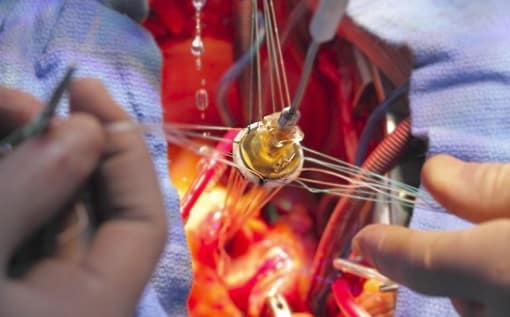Heart valve operation is indeed a treatment used to address diseases of the heart valves. When at least one of 4 heart valves is not functioning properly, this is referred to as heart valve disease. The heart valves are responsible for ensuring that blood flows in the proper direction through your heart.
The pulmonary valve, mitral valve, tricuspid valve, and aortic valve are the four heart valves that must function properly. Each valve has flaps, which are referred to as leaflets or cusps for the mitral & tricuspid valves, and leaflets or cusps for aortic & pulmonary valves, respectively. This pair of flaps must open or close once for every beat of the heart. Valves that do not open or seal properly cause blood flow via the heart to be disrupted and delivered to the rest of the body.
In heart valve operations, a doctor repairs and replaces the heart valve and valves that have become damaged or diseased. Heart valve repair or replacement can be accomplished by a variety of surgical procedures, including open-heart surgery and minimally invasive cardiac surgery.

The sort of heart valve operation that is required is determined by a number of criteria, including age, health, as well as the type and extent of heart valve illness that you have.
For the same process and treatment in India, the cost of heart valve repair is often a quarter of what it is in the United States and other wealthy countries. In India, the cost of Heart Valve Replacement Surgery starts from Rs.4, 46,000.
There are two types of Heart Valve Replacement Surgery. It includes:
In order to put patients in a sleep-like condition throughout the treatment, anesthetics will be administered to you before the surgery. During the treatment, you'll be attached to a coronary bypass machine, which will maintain blood flowing through your body as much as possible.
A heart valve procedure can be done via normal open-heart surgery, which entails cutting the chest through the breastbone to access your heart valves. Minimally invasive cardiac surgery uses smaller incisions than open-heart surgery and is, therefore, more cost-effective.
Surgery done using long instruments introduced via one or more tiny cuts in the chest with the assistance of a robot is an example of minimally invasive heart surgery (robot-assisted heart surgery).
Minimally invasive bypass surgery may result in a hospitalization, a speedier recovery, and less discomfort than open-heart surgery, depending on your circumstances.
Depending on whether the heart valve cannot be mended and whether a catheter-based operation isn't an option, it may be necessary to replace the valve. Your doctor will remove the heart valve & replace the same with a mechanical valve or with a valve manufactured from cow, pig, or human heart tissue in order to repair a damaged heart valve (biological tissue valve).
Q1. What can I not do after heart valve replacement surgery?
You will likely be not able to partake in major physical and strenuous activities for the first four to six weeks of your recovery period after surgery. You will also need to avoid lifting heavy objects or indulging in activities that can strain your upper chest or muscles.
Q2. How long will I have to stay in the hospital after a heart valve replacement surgery?
After your heart valve replacement surgery, you’ll likely need to stay put in the hospital for over a week. After that, according to the health status and report as assessed and monitored by your doctor, you will be able to go back home. You will be guided by a set of rules and restrictions that you should follow during your recovery period which will last for over four to six weeks.
Q3. Will heart valve replacement surgery shorten my lifespan?
Generally, there’s no such consensus that heart valve replacement surgery reduces your lifespan. However, there are rare cases where the person who has undergone a heart’s aortic valve replacement has faced issues in the long run which have reduced their life expectancy.
Q4. Can I fly after a heart valve replacement surgery?
It is advised that anyone who has undergone a heart valve replacement surgery should not fly for at least four to six weeks after the surgery to help avoid any issue of complications arising.
Q5. How much should I walk after a heart valve replacement surgery?
You should look to walk at least 2 kms every day for a month or 30 mins along with a brisk light exercise after your heart surgery to help recover properly and remain healthier. It is best advised to avoid partaking in activities like jogging, running, lifting heavy weights, swimming, tennis, jogging, and such for at least eight to ten weeks from your surgery to avoid any issues.